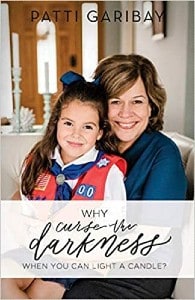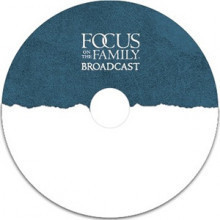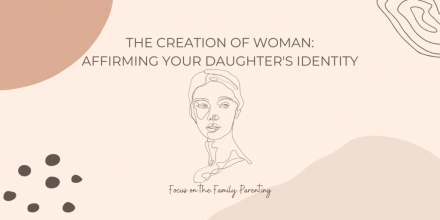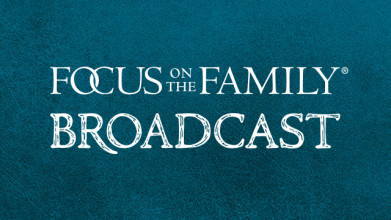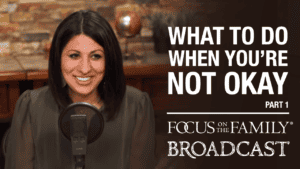Preview
Woman #1: The girls I bonded with going through the toughest years of adolescence still provide me with unfailing support and friendship. These friendships were forged over learning to scale rock faces, type boat knots and understand the history of our flag.
Woman #2: My daughter has blossomed into a kind and God loving young lady. Through this program, she’s made and kept so many wonderful friends who share her faith.
Woman #3: One of the first miracles I experienced in American Heritage Girls was finding leaders who are willing to mentor me throughout my entire time there. These amazing women helped me grow my confidence in ways that I never thought possible. By challenging me not to think of the things that I couldn’t do as well as others, but instead focus on the things that I could do better.
End of Preview
John Fuller: Hmm. Those comments reflect the heartfelt gratitude that thousands of families have for American Heritage Girls. It’s a national scouting program that helps girls and young women grow in their faith, character, service to God and to others. Thanks for joining us today for Focus on the Family with Jim Daly. I’m John Fuller. And today you’ll hear all about the origins of American Heritage Girls and the incredible impact they’re having on so many young women. And we’re going to encourage you to consider how you can join in and, uh, have your daughter participate.
Jim Daly: John, I didn’t have the privilege of raising daughters. We did have a few, uh, foster daughters that came through our home when we were fostering. So that was an experience, but I did raise two boys. And I’m looking forward to the discussion. How many? Now, you have three girls.
John: We have three girls, and I love them dearly. They’re all adults now. And I don’t see them enough.
Jim: Did you see a big difference raising girls from boys?
John: Yes.
Jim: (laughs).
John: (laughs). Okay. Significant.
Jim: We’ll leave it at that. But, you know, as parents, we want to do everything we can to protect our girls and our boys in this culture. There’s so many, uh, doors that are open in that current of culture. Dr. Dobson used to talk about that how in his day when he was a little boy, those doors were not only shut, they were locked, but today, uh, whether it’s pornography or whatever, the issues that culture is pulling kids toward, those doors are not locked. They’re wide open and beckoning our kids to come. So it’s wonderful to identify organizations that are doing everything they can to teach young people about the biblical truths, the biblical values that this country was formed on. And I’m excited about covering, uh, the content today.
John: Yeah. There are so many different, uh, serious concerns for moms and dads. And we all as parents need help to really get a good, uh, foundation, a moral foundation for our kids, especially our girls. That’s why, uh, Focus is here, that’s why we’re talking today to Patti Garibay. She joins us and, uh, she and her leadership team are doing such a great job at American Heritage Girls to support Christian families and help girls grow up to be godly leaders and influencers in their generation.
Jim: And we have a crowd around us.
John: We do.
Jim: We got to mention them.
John: It’s a lot of, uh, a lot of energy, these young ladies and their parents are bringing.
Jim: (laughs). Let’s hear from you. Give it a shout girls. (laughs). So we have both, uh, leaders as well as those that are participating in American Heritage Girls. And it’s good to have everybody. Probably about 15 people around us. All right, Patti, welcome to Focus.
Patti Garibay: It is a pleasure to be with you.
Jim: Probably long overdue. Uh, we have, uh… You know, uh, back in the 90s, you started this effort. Um, and let’s, you know, let’s go there. Uh, what was the impetus for you to start American Heritage Girls? What was going on in the culture? What was going on with Girl Scouts? Have you heard of Girl Scouts before?
Patti: (laughs). Yes, I have.
Jim: What was going on there?
Patti: Well, I had been a, a troop leader for 12 years.
Jim: And you were a girl scout yourself?
Patti: Absolutely.
Jim: Okay.
Patti: My mom was my leader, and it was just a tradition I wanted to maintain. And once we had our daughters, like John, we were so excited about that and also about raising them up in the way they should go. And we thought that Girl Scouts being a character development program would be a great way. It was good for me; it certainly would be good for my daughters. And, uh, I started to look into them a little bit more as I had served them for about nine years when I started to have some questions.
Jim: Mm-hmm.
Patti: And one of the very first questions really came from Focus on the Family itself, uh, when I was, um, alerted to a sexuality camp that was happening literally in my own backyard.
Jim: Wow.
Patti: Now there was no mistake that, that happened in Cincinnati, Ohio, and that the Cincinnati, Ohio mom heard that. But I was able to sort of brush that off and say, “I won’t send my daughter to that camp,” right?
Jim: Yeah.
Patti: But then later in 1993, the Girl Scouts USA decided that they were going to change their oath, their promise that Juliette Gordon Low, the founder, had created in 1912. And they had maintained it for 80 years.
Jim: Huh.
Patti: So we’re wondering why would they make this change to no longer mandate an oath to God in the Girl Scout promise? Now, I knew that I cared your development program had to be based on something, what was going to be the moral barometer? What would provide right from wrong? And when you remove God, you remove all of that. Right?
Jim: Yeah.
Patti: So more things came from there. As I started to investigate the moral relativism, that was very evident in all the curricula. The, the strange way they were handling sexuality and that sexuality camp was pro-abortion, pro-homosexual. It was horrible.
Jim: When, when you look at that, what do you think was going on within the management of the Girl Scouts? I mean, this is just your observation I get that, um, but why, why were they feeling like something that had been so successful raising girls, helping to raise girls, helping parents to raise girls of character, why did they fall prey to what now is on full display, the woke culture?
Patti: Mm-hmm.
Jim: I mean, why back in the 90s was the Girl Scouts so vulnerable to that?
Patti: Well, I think the way they’re structured creates a vulnerability that allows for an administration to come in and take over. And we’ve seen this happen time and time again. And with them, their councils are owned by the national organization. So if the national organization’s administration changes its way or loses its way in this instance, it’s easy for that mission creep to occur. And for me, what, what I was seeing as I dug in deeper, and again, I had been a girl scout leader for three troops for 12 years. You think I would’ve known.
Jim: Yeah.
Patti: But I didn’t until I started to dig. And I realized that Betty Friedan had served on the national board. Janet Reno. I mean, these are names if you’re, if you’re my age, you know what those-
Jim: Right. Fairly liberal perspective world view.
Patti: Very, very much so.
Jim: Right.
Patti: And, um, so we started to see the changes, I guess, were even occurring under my own, on my own watch, so to speak.
Jim: Yeah.
Patti: And so we, we realized this, this snowball has really been going down the hill for quite a while. But with any good Christian, I think needs to try to make changes. And then when that does not happen, you know, you give it your best shot. Right? And we did. We had a small group called Caring Responsibly for our Youth, where we tried to raise awareness about what was going on in the Girl Scouts. And I thought, certainly if they understood who their clientele was, they would change their ways. But this had been going on way too long and we were just a bother.
Jim: Yeah. And I, you know, I so appreciate the title of your book, uh, Why Curse the Darkness When You Can Light A Candle? I mean, that is part of the problem we have today in the Christian community, because the culture is really aiming at us, not working with us any longer. And that’s a change, that’s a course change that the church has got to get used to now. Um, but speak to the title of that book and, and what that means to, you know, rather than curse the darkness, you know, do something.
Patti: Mm-hmm. Well, there’s so much to that title of that book. Um, my father really inspired me with the name of that book. My father and I had a very wonderful relationship. He had acute multiple sclerosis. I don’t recall him ever walking on his own. Um, he walked me quote unquote “down the aisle in his electric wheelchair.”
Jim: Oh yeah.
Patti: And so he was a, a feeble man, but a strong tower.
Jim: Wow.
Patti: And so where he… You know, they are weak, you can be strong. Right?
Jim: Right.
Patti: And that is what my father represented. And he would hear these tales as I discovered. And was, um, really researching the Girl Scouts. He would hear the tales and I would come back to him. He was in a nursing home, and he was bedridden. And I would tell him the next tale. And then finally, my final, my final attempt was to put a Christian on the board of directors for the local council. And that Christian was my husband, an accomplished businessman who I know would be an asset and could make positive change. When he heard what happened at that annual meeting, when my husband and I were really… Our reputations were just torn apart publicly. And they were just making up lies about us. When I told him that he said, “Patti, why curse the darkness when you can light a candle? Start something new.”
Jim: Wow. And you were probably like, are you kidding dad? That’s the Girl Scouts.
Patti: (laughs) I know.
Jim: Right.
Patti: I’m like, “Wow.” And, and you know, though, at the same time, what was so cool is that when heavenly father was speaking to me as well, and he was saying, you can do this, because see, I was a very busy mom. And I think I was so busy, because I wanted to hide and cover up the stuff I really needed to deal with. And so busyness is a good way to do that. Isn’t it?
Jim: Well, now you’re getting to something that’s hitting all of us in this culture, all of us Christians. What is expected of us? What should we do? How do we light a candle, uh, not just in the area of scouting, but you know, your entire life?
Patti: Yes.
Jim: Um, so that’s something we’re going to continue to discuss. I want to get to the conversation you had with your, I think your youngest daughter when you made the decision to light a candle and start American Heritage. Um, what… How did that go down? And she was 10 at the time or?
Patti: She was 10.
Jim: So she… And she was in Girl Scouts.
Patti: She was in Girl Scouts.
Jim: So that had to be… That’s kind of like moving in junior high. Right?
Patti: (laughs). Yes, it is.
Jim: Hey, we got a great exciting plan for you, honey, we’re going to move to a different state and you’re going to meet new friends, and this is going to be great. And she’s looking at you like, “What? How could you do this to me?” So I’m assuming it had a little of that flavor, but maybe not, maybe she saw it.
Patti: A little, a little bit. You know, she had heard the struggles. I did not hide these from her. I wanted her to be very aware that in this culture we need to be ready to fight our battles, the ones that are worth it, and this was worth it, you know? And so she was coming alongside, and she was frustrated too. She would see how her mom was being treated. There were so many lies, and I can go on and on.
Jim: Yeah.
Patti: But she understood that there was unrighteousness in what should have been a righteous culture for the Girl Scouts.
Jim: What a great lesson!
Patti: Yes. Oh my goodness! And to see her today as a leader of her own daughter in American Heritage Girls and a very, um, very successful accomplished businesswoman that brings her faith into the workplace, that’s a blessing. It’s been worth it.
Jim: How old is she today?
Patti: Today she’s 34 years old.
Jim: Oh, that’s great. That’s awesome. Well, let’s… Uh, for the listeners that may not know what American Heritage Girls is all about, give us the pitch, give us the description. What is it?
Patti: Oh please, yes. It is a Christ centered scout type program that is saturated in biblical worldview. That’s the lens that we look everything through. It has badges and service and leadership and emotional and social strengths. And also this beautiful mentoring, the way it’s built, because I think I had mentioned I had been a leader for three troops and that’s in the Girl Scouts, and that’s because they broke it up by age level. Our troops are ages five to age 18. And we build it so that the older girls can train the younger girls and the younger girls can look up to those older girls, almost a Titus two approach.
Jim: Uh-huh.
Patti: And then we, we saturate that with amazing adults that are spirit led, that love the Lord and they love the girls, and they understand the influence that girls have in the culture, that the hand that rocks the cradle does rule the nation and this is important stuff. And that’s how we get to work alongside one another.
Jim: Yeah. And that is so good. And again, the distinction, I mean, you’re looking at something that started with terrific Christian roots and heritage in the Girl Scouts back then. And then they got away from it. They let it go, like Harvard and Yale and so many of the institutions in our country. And you’re, you’re bringing them right back. I think the founder of the Girl Scouts would be very proud of American Heritage Girls.
Patti: (laughs) I would hope so.
Jim: Yeah. That’s more of what I intended; I think she would say.
Patti: Exactly.
Jim: Um, you have a story about a teen girl named Allie, who at first glance might not have been the ideal candidate, uh, for your organization, yet American Heritage Girls had a huge impact on her life. Uh, what was Allie’s story?
Patti: This, this story, I get to hear a lot of stories. And that’s such a blessing to see fruits from your labor in your own lifetime. We’re so undeserving of that. But I, I carry this picture with me. This is Allie. And I’ll never forget her. We oftentimes have an event called meet the founder where maybe I’m in a, in a city and I can meet the girls. And I love it. It’s, it’s so good to, um, not just to be blessed by that, but to understand what they like and what… Where we need to grow the program, where, where there’s the holes.
Patti: And so, Allie, was one of these girls in, in Cincinnati, Ohio. So you can imagine there were a lot of girls at this meet the founder event. And she was patiently waiting, waiting, waiting, letting all the girls ahead of her. She had cold black hair, black fingernails, um, strong earrings. And I’m sort of getting she’s like having some trouble, okay, just by her appearance. And that doesn’t necessarily always do that. But for me, I was anxious to talk her.
Jim: Yeah, it’s an indication.
Patti: It’s an indicator. Yes. And so she was so polite, kept letting the girls go. And then finally at the end, um, my question to every girl when I do meet the founder is what is it about American Heritage Girls that you like and how can we make things better? Well, she stopped me right after I said, what is it that you like? And she said, “Mrs. Garibay, AHG saved my life.” And I said, “What?” I’d never heard this before. “What do you mean?” She said, “I joined as a pioneer,” which is a seventh grader, junior high awkward time.
Jim: Yeah.
Patti: And she said, “I was cutting. I didn’t want to live. My parents were going through a divorce, and I, I really thought it was my fault. And so I wanted to take my life.” She said, “Then one of my friends reached out to me and asked me to come to American Heritage Girl meeting.” She said, “Suddenly, I learned that I had something to offer, I could set and achieve goals, I could serve others and learn about my passion, I could understand that I’m not the only one going through this. And moreover, I could understand the love of God.”
Jim: Hmm.
Patti: Now, that is why we do American Heritage Girls is for girls like Allie.
Jim: Yeah. I think that’s it. John (laughs), I mean, if you have a girl in your life, if your daughter, granddaughter, I mean, I would really encourage you to look into American Heritage Girls.
John: Yeah. We’ve got details on the website. The link is in the show notes or call us, we’d be happy to tell you more, uh, at our website, that’s focusonthefamily.com/broadcast or give us a call 800, the letter A, and the word FAMILY, 800-232-6459.
Jim: Patti, um, it was really positive when I looked at the material, just how, uh, much you cover, how much ground. And here at Focus we hear from Christian families and non-Christian families about what they’re going through. They’re asking for help. And that’s good. We want people to do that. And what we see, especially with, uh, young girls, identity issues, um, you know, the social media problem, oh, eating disorders, all kinds of things that are pressuring our girls to, uh, think in ways that are self-destructive, etc.
Jim: And, you know, the thing that always surprises me, because I did fellowship of Christian athletes in high school, and I remember, you know, people would be like, why would you do that? And teachers even I think more so today these teachers and school administrators, it’s almost like they fear a child embracing God more than if they were on drugs or alcohol. I mean, what’s the big deal? This child like me, an orphan kid could live a good life, be committed to good things, hopefully be a good citizen, and even if they’re right, which I’m not saying they are, but even if, we will have lived good lives, and is that a bad thing?
Patti: (laughs). You know, it does seem so topsy turvy, doesn’t it?
Jim: Silly.
Patti: Yeah. Absolutely. And, you know, what creates confusion, that’s not from the Lord. He’s a God of order. That is the adversary. And he’s all around us. And he’s trying to infiltrate into girls. And he, he’s trying to infiltrate their very identity, which is their God given identity. And we know from Genesis five he made a male and female and now we’ve got confusion around binary and spectrum and all of this stuff. And it’s like, who would’ve ever thought? Now, Jim, when we started in 1995, there’s no way, but gender was a concern. Eating disorders, yes. Anxiety, yes. Fear, yes. But not gender.
Jim: Well, and I so appreciate the environment where they can reinforce positive things.
Patti: Yes.
Jim: You know, where hopefully a girl who is maybe confused can talk to the other girls or a leader and say, “I’m feeling these things.” Does Heritage Girls I mean promote that kind of open dialogue?
Patti: Oh, absolutely. A matter of fact, we’re creating more and more tools around that for our leaders. One of our latest is A Raising Godly Girls Guide to Gender and Identity. And you can have a free download of that on our site. And it’s really helpful, because that discussion cannot be ignored. It’s all over the media. Even if we try to protect our children as we want to and as we’re called to, they’re still going to be having to be bombarded by this. So what are we going to say? Are we going to freak out when they bring it up? No, no, no. We need to be well prepared, well-armed. And this book will help. It’s a beginning along with other resources that will help a Christian parent have tools in their toolbox.
Jim: Well, maybe we can link to that too, John-
John: Yeah
Jim: If that’s okay with you-
Patti: Absolutely.
Jim: we can point them to that resource. Uh, Patti, another factor you address is spiritual training for girls. You’re, you’re hitting on that obviously, but something you called GRIT.
Patti: Hmm.
Jim: What is GRIT? I like the name.
Patti: I do too. I’ll tell you-
Jim: I love the acronym.
Patti: we need to raise up gritty girls. And, and what, what GRIT stands for in this context of our leadership curricula, which is so fantastic, by the way, it’s called girls rooted in truth.
Jim: Oh, that’s even better.
Patti: Okay, with grace. So we need to know truth, right? We need to know scripture to know truth. But we need to be able to deliver it in a graceful fashion. And that’s really the beauty of what GRIT with grace is. And so GRIT in another term is resilience, right? We got to be resilient. We can’t just be knocked down once, because that’ll happen, as Christians, we’re going to be attacked and we are attacked.
Jim: Yeah.
Patti: If you cannot pull yourself up, be able to recall those scriptures to encourage you and inform you, then you’re going to fall prey to all that’s out there, because the majority out there is against what you’re about. So you got to be gritty.
Jim: I would think, Patti, uh, people have a problem with American Heritage Girls, because when a recent Supreme Court nominee was asked the question, what’s the definition of a woman, she couldn’t answer it.
Patti: Yes.
Jim: I mean, you know, the culture’s in trouble, if that’s true. So here you represent everything that a woman should be, right?
Patti: Absolutely.
Jim: So how do you answer that question? How do you define what is a woman?
Patti: Mm-hmm. Well, this is key piece. You know, it’s so interesting how we were trying to remove labels for the longest time when I was young and now we’re putting them back on people, right?
Jim: At hyper speed.
John: Yeah.
Patti: At hyper speed. I’m like, what is going on right now? So these labels of what a girl should be or should look like, that mold needs to be broken, number one, because not every girl loves frills and lace and goes shopping and eat cupcakes.
Jim: Right.
Patti: You know? Right. Girls… I mean, these girls, these girls in this beautiful area, they like to go climbing and, and they love to-
Jim: That’s the gritty stuff I was thinking of.
Patti: That’s the GRIT. You know, they’re in the dirt, they’re having fun, they love the horses, and they love all the things that really are difficult, because they’re challenging. And that’s what makes this program so cool. Because you could do the easy stuff while you’re, you’re studying your stuff in your curricula. Right? But here’s where you can experience it. And so this is crazy to think, okay, because I like horses and I like to climb, I must be a tomboy, which means I must be a boy, which means I’m not a girl.
Jim: Right.
Patti: This is the trajectory. This is the feelings.
Jim: The conclusion. Right.
John: It’s what the culture will guide toward.
Patti: Exactly. And it’s totally illogical.
Jim: Yeah, no kidding.
Patti: But yeah.
Jim: Yeah, I mean, that’s it. Let me ask you about this. So, uh, there was a, a woman who ran for president a few years ago. My son and I were watching her acceptance speech on TV. And he was 14 at the time. In the speech, she talked about the need to support the police and people booed at this convention. And the next thing she said was, you know, we also have to protect the right to, uh, women’s reproduction or abortion, and people stood and gave it a standing ovation. And my 14-year-old son said, “Well, that seems really backward. The audience’s response, we, we are applauding death and sitting on our hands about life, people that protect us and give us life.” I thought, “Wow, okay, my job’s done,” right?
Patti: (laughs) Well done.
Jim: You probably experienced that with the girls too in American Heritage. They’re getting that kind of perspective, which is to look through life with the lens of truth, which is scripture that God is for life.
Patti: That’s right. And it’s timeless. I mean the relevance of the scripture, and that’s what we’re trying to infuse in this program, is that it’s not something that you put on the shelf for Sunday, and you pull it off. And then this is my Sunday school, and this is my Christian walk, and it stays on Sunday. This program is literally a journey, it is a family, as you can see, a family is around us today. We’re all part of that family and that’s God’s family. And to understand that who they are and whose they are, each girl, whose they are, their identity is in Christ. They have to understand that everything works for his good and everything has a place and he’s got an answer for every issue, no matter what the cynosure is. Right?
Jim: Yeah.
Patti: Um, there’s an answer in the scripture and it’s very relevant.
Jim: Well, I’m sure like any family, we’re all, uh, slightly dysfunctional. I’m sure it’s not perfect.
Patti: Oh yes.
Jim: And you know, you’re always looking for ways to improve, and that’s great. One of the ways you’re, uh, trying to improve American Heritage Girls is by creating mentors out of the older girls so they can mentor the younger girls. That’s great. I mean, speak to that.
Patti: It works so well. And some of these older girls could speak even better to that. But these girls, they love to be able to teach the younger one’s skills that they’ve acquired through the years and also to teach them how they should live. You know, now how should we live? Well, let’s model our behaviors. And, of course, the older girls are taking their cues from those amazing adults that are volunteering their time.
Patti: And I’ll tell you what? I had a prophet of sorts, um, at one point saying, “Patti, someday you’re going to be leading a women’s ministry.” And I never felt I was the women’s ministry kind of girl.
Jim: Interesting. Yeah.
Patti: I, I had too much of a sense of humor.
Jim: (laughs).
Patti: I, I just couldn’t quite be that, you know? And here look at this, she is right, because this has become a women’s ministry as well, because the volunteers and the women and the men in this program are growing spiritually, they’re growing professionally, they’re also growing in their roles in their churches because they’ve been part of this organization. So it really is running the gamut of adulthood, girlhood and it’s bringing the family together.
Jim: And again, what’s so crazy is that people find this offensive.
Patti: Yeah.
Jim: I can’t believe you’re doing this.
Patti: Well, our name is very offensive. American Heritage Girls, everything about that’s offensive.
Jim: (laughs). Okay.
John: Um, earlier you had referenced mental health issues, and that’s, that’s an area of concern that I have. How have you had to adjust or add to the program since the founding back in the 90s to now, it seems that mental health issues are really ratcheted out.
Patti: They really are skyrocketing, and particularly for girls. Uh, the emergency room visits since COVID started for girls ages 10 to 14 has gone up 50%. Um, the statistics are alarming of what’s going on. And 33% of all girls have a diagnosed anxiety disorder. That’s the diagnosed ones.
Jim: 33%. Yeah. Wow.
Patti: 33%. So one out of three have this.
John: That we know of.
Patti: That we know of. And this is really at a critical time. And, you know, we know what the Lord says in scripture about fear, and anxiety all stems from fear, right? Is that we should not have it. It’s literally a four-letter word for the Lord, we should not have fear.
Jim: Yeah. And it, you know, it is a challenge in this life. And I know many people that write us and contact us, uh, they battle with anxiety. And we get that. And, you know, again, the Lord is there to ease that reality in a sinful world.
Patti: That’s right.
Jim: So let me, uh, end with this question. You have so many success stories and you could probably spend hours just going over them and letting us know about them. But you describe a young woman named Esther, who discovered her full-time career and calling through your organization. What happened with Esther?
Patti: Oh, Esther’s from Colorado Springs, which is the coolest thing.
Jim: Oh good. Yeah.
Patti: Uh, she had earned her aviation badge as a young tender-heart and she… At the time it was called tenderfoot, but now it’s tender heart.
Jim: Okay.
Patti: And she loved all things plain. Okay. And she continued to earn that badge at different levels, because we sort of accelerate the skill level according to the girl’s age-
Jim: Oh, that’s great.
Patti: which really gets an in depth dig and also helps a little bit with their vocations and understanding what kind of things really excite them. So, Esther, had one of those stories. She would go to the Air Force Academy, one of the hangars, she would listen to some of the guys that were there, Vietnam vets, World War II vets, spin their yarns about their time when they were in, you know, active combat, some of them. And she was fascinated by it. And so she decided that she wanted to do her Stars & Stripes project. Now, Jim, this is the highest level of American Heritage Girls award. And I don’t even want to equate it to something else, because it’s far more difficult than that. So, um, the Stars & Stripes Award, and she wanted to have the living history of the national archives. So it was a big project to get our World War II vets on audio so that it could be forever in the national archives. And that’s what she did as her Stars & Stripes. So it was all stemming from this badge she earned as a tender-heart explorer, pioneer and patriot. And then later, she became a missionary aviator in Uganda.
Jim: Oh my goodness! And all the moms went, oh, that’s incredible, we’re signing our daughter up right now. (laughs).
Patti: That was so awesome. Yes.
Jim: No, that’s such a good story.
Patti: Yeah.
Jim: And, Patti, I want to say thank you for, uh, you know, just moving with the lighting of that candle. I’m so glad your dad said, “Hey, why don’t you do it?” And, uh, what an amazing thing to look back! Now, how many girls are involved?
Patti: There’s 55,000 members at this point.
Jim: Oh, that’s incredible.
Patti: They represent about 1,250 churches, you know, that are our charter partners. And we are so grateful for them that they believe in girls.
Jim: Well, let’s aim for a million.
Patti: Let’s do it. Let’s do it. This could be the tipping point.
Jim: Okay. Let’s get a million girls involved with American Heritage Girls.
Patti: Amen.
Jim: And I just want to say thanks to all the girls in here, thank you for being here, and the troop leaders as well. Uh, to the listener, we want to make you aware of what American Heritage Girls is all about. It’s a great alternative for your daughters or granddaughters ages five to 18. And if you’re parenting girls or you just have a heart for equipping the next generation, get a copy of Patti’s book, Why Curse the Darkness When You Can Light A Candle? Consider partnering with us in ministry and make a gift of any amount today to Focus on the Family. And we’d love to send you Patti’s book as our way of saying thank you.
John: Yeah. Donate and get your copy of this really great book by Patti Garibay. Our number is 800, the letter A, and the word FAMILY, 800-232-6459, or stop by focusonthefamily.com/broadcast. Next time,
Preview: Mark Hancock joins us to share a story of a faith-based scouting alternative for boys called Trail Life USA.
Mark Hancock: If we fail this generation, it won’t be because we over-challenge them, it will be because we under-challenge them.
End of Preview










